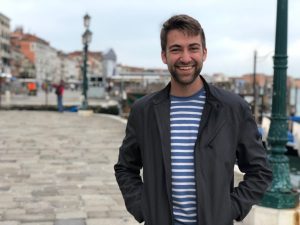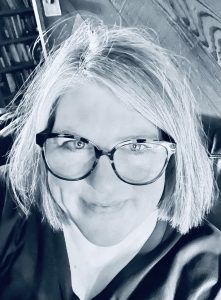Grant Burkhardt
Poetry Contributor
Grant Burkhardt is a writer of poetry and short fiction, currently working on collections of both. He was born in Pittsburgh, Pennsylvania.

Poetry Contributor
Grant Burkhardt is a writer of poetry and short fiction, currently working on collections of both. He was born in Pittsburgh, Pennsylvania.

Poetry Contributor
Alaskan Poet, Moon Gazer, Raven Watcher, Northern Trekker, Teacher. Kersten Christianson derives inspiration from wild, wanderings, and road trips. Kersten is the poetry editor of Alaska Women Speak. She has authored Curating the House of Nostalgia (Sheila-Na-Gig, 2020), What Caught Raven’s Eye (Petroglyph Press, 2018), and Something Yet to Be Named (Kelsay Books, 2017). Kersten lives with her daughter in Sitka, Alaska and enjoys road trips, bookstores, and smooth ink pens.
Kersten Christianson
I want to pen a note about spring.
Not the dead alder, rain after rain after
rain despair of it, but the rose
gold sheen of storm having passed,
dissipating at the knife-sharp edge of outer coast
where blue herons and mallards frequent
the estuary’s ebb and flow.
I want the medicine of tender greens
the tangle of blooming branch,
squall of cherry blossoms adrift
under patches of blue-sky canopy
with supple heart and thoughts of you,
I want the spring that snaps winter’s back.
Tylyn K. Johnson
let this momentary experience be
for us, to turn ourselves
into a messy painting
on your wall, made of
our skin and flesh and
sweat and laughter
Emily Kedar
I come back
to find my grandmother’s
pink geraniums dead. The only
living being
that knew us both
and had no tongue to lie.
I drag my finger
across the glass face
of the coffee table. My thumbprint
warped and elongated, presses
down into dust.
I rearrange the stones
I’d left on the window sill
back the way they were.
The coffee grinder’s bust, so
I head out
into the light snow
of morning, my feet landing
step after step
in someone else’s footprints.
Vikki C.
This world is wounding itself. I walk through the conflict, avoiding the churches, the in-laws and all acts of confession. My lithe body, barely a nightdress, floating south and south again, until I reach my youth. Quiet feet wading through the boulevard of pink cherry blossoms from another heaven.
Dad leaves the petals unswept over the lawn, to hide the unkempt yellow grass from Mum, or to mask the scars in advance. The driveway is blanketed too, and the car is still covered with the darker pink petals from the hospice visit. We let them be.
Ordinary men say famous artists only paint almond blossoms as a distraction from the asylum. That if we fill our eyes with portraits of spring and promise, bright buds on blue, we would be cured for a little while, enough time to find the exit. That insanity would not encroach with its heavy black bough, latching the door from the inside out.
But now it’s 2023, and I’m at Kensington cemetery paying respects to the latest victims of tragedy. The cherry trees are weeping heavily over the wet lichened graves, mourning about me leaving too early that one winter Sunday, naively hurrying to a lover in my next life. Your pale face at the small window washed in evening light, as if watching from the other side – seeing the divorce and all the babies swept away to far-off territories. Unreachable.
Occasionally, they call home, pretending to keep me alive. They’re a hardy species known to weather the harsh winters in places cut off by cold wars. Bombs, crisis, severance. The signal is lost after a minute, but I know they remember the womb like a safe haven.
Still, there are brave men who carry injured women like me to safety, comforting us with white lies: dusting the shrapnel from our hair, brushing it off as just sakura. They tell us that the flowerless vase in the hallway is shattered – but maybe the house can be salvaged.
That there are girls with minds like mine. Daughters who are fragile blooms, caught in the middle of battlefields. And as much as they belong with us, we can never carry them home safely, without the petals coming apart in our hands.
Valerie Hunter
Ray is the one who bought Frederick,
planted him, named him,
used to invite all their friends
to an annual midnight party
in Frederick’s honor.
But Ray is gone now,
has abandoned Amy and Frederick both,
though probably he would’ve
taken Frederick if he could have.
For fifty-one weeks of the year,
Frederick is a bit of an eyesore,
a shaggy giant lurking uselessly
in the corner of the back yard.
Thankfully he doesn’t need much care;
Amy remembers to water him occasionally
if it hasn’t rained in awhile, and sometimes
she gives him a kind word, or says,
“Why so cereus?” because she knows
Frederick appreciates a good pun.
But when May comes
she watches him closely.
Each year she fears his magic will fail,
that he’ll remain an undignified lump,
but then those first ugly buds appear,
bulging tumors amidst the leaves.
They develop rapidly, sprouting
their spiny alien tentacles,
so familiar,
so strange,
and after a decade
of being intimately acquainted
with Frederick’s anatomy,
she knows exactly when to stay up
with her coffee and her thoughts,
pulling the most glorious of all-nighters.
She tells no one, extends no invitations—
Ray might have seen Frederick
as a spectacle to be shown-off,
a freak to be gawked at,
but she considers him
her private magic show,
the flowers blooming for her alone,
enormous and luminous,
with their weird medicinal fragrance
that heals her soul,
makes her believe that the world
is an inexplicably wondrous place,
full of small miracles.
She always goes in before dawn,
avoiding the back yard
for as long as she can afterwards
to hold onto the memory
of that magnificent, glowing Frederick.
Each year, as she shuts the door,
she spares a thought for Ray,
who left her this one perfect piece of beauty,
this midnight marvel
that she knows he must miss.
Robert Rice
Coming back from the mailbox,
near the fence I noticed
its small, green swords pushed up
through the near-frozen dirt.
It stopped me.
Sometimes
—not often—
a simple shift of light
will shake and crack
the thin screen of the world. Then each
defended story, end-stopped,
will turn in the faded light of evening,
cross the gray sky in you,
leave no trace.
Ed Brickell
The world where I live is in slow secret.
The old bird feeder, forever hanging,
Lies on the ground. Its branch is gone.
The fallen leaves from the nearby oak tree
Creep by inches to the back fence.
The sun sneaks near the horizon all day.
A new boy seems to have arrived by himself
In a house sold in haste a few doors down.
He never wears a shirt, runs instead of walks.
The other children have agreed to his rule,
Cheerfully doing the most dangerous things.
New screams fill the air.
A lot, leveled at the top of the hill,
The house erased. No memory
Of what it looked like, who lived there.
Dogs I have never seen before snarl and snap.
All these polite strangers – names of confusion,
Lives of utter mystery.
I want to move somewhere,
Be the question mark –
The one whom no one has seen before,
Who changes how their days happen.
Suddenly inhabiting the scoured hill
Where something was they can’t remember.
Karen E Fraser
delicate petals creak open
slower than snowflakes falling
in an airless, lavender sky.
wide-eyed stamens quiver, waiting
patiently to be pleasured by bees.
stems of ear-shaped leaves
silently unfurl a lush fullness
in blinding verdant greens.
the light of life remains fully switched on,
fizzing with moon-neon phosphorescence,
ever emergent, ever consuming, gifting and
receding in waves that spiral through
an inescapable fragrance-
a constant, unnameable
yet deeply known by the gentle heart.